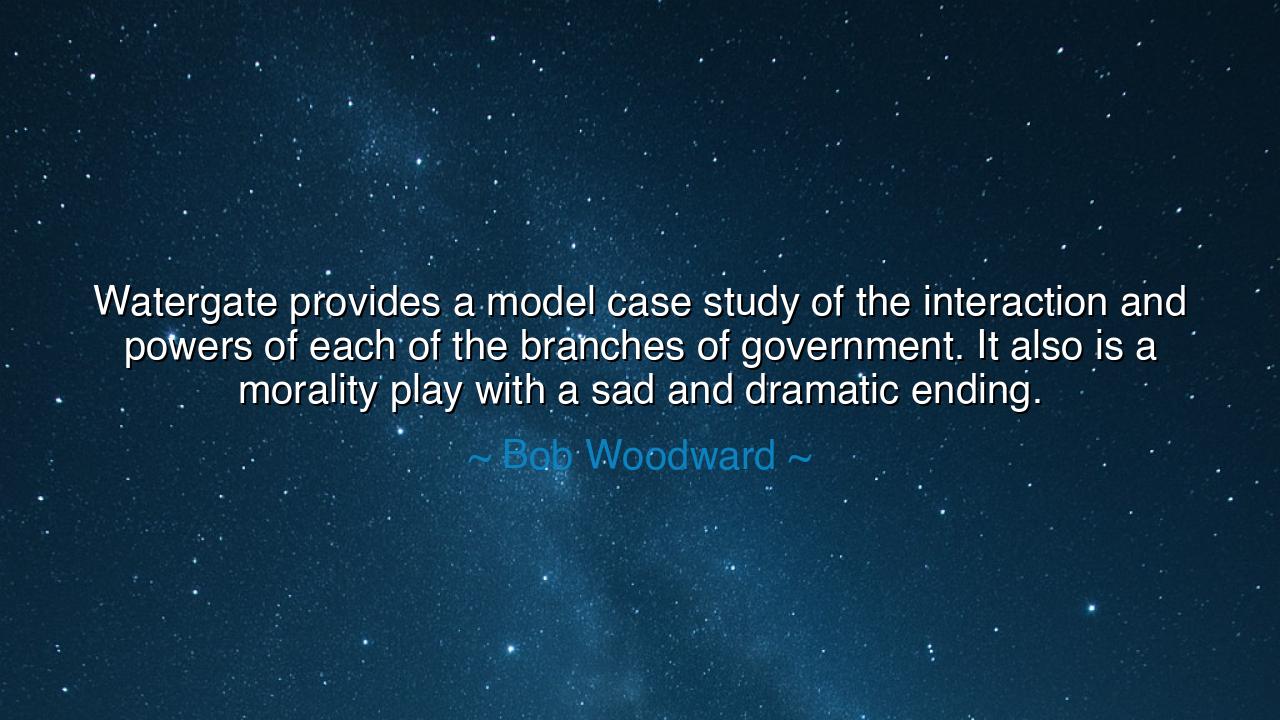
Watergate provides a model case study of the interaction and
Watergate provides a model case study of the interaction and powers of each of the branches of government. It also is a morality play with a sad and dramatic ending.






In the solemn and penetrating words of Bob Woodward, one of the journalists who unveiled a scandal that shook a nation, there lies a reflection both political and moral: “Watergate provides a model case study of the interaction and powers of each of the branches of government. It also is a morality play with a sad and dramatic ending.” These words rise from the heart of one who witnessed the unraveling of power itself — a man who saw truth confront deceit, integrity face corruption, and the pillars of democracy tremble beneath the weight of human ambition. His statement is not merely an observation of history; it is a warning and a lesson, a mirror held up to every generation that seeks to understand the balance between authority and virtue.
Watergate, in its essence, was more than a scandal — it was a revelation of the fragility of trust. It began with a burglary, a seemingly small crime, but behind it lay a chain of deceit that reached the highest office in the land. When the press, the courts, and Congress each took their place in this unfolding drama, the world witnessed what Woodward calls the “interaction and powers of each of the branches of government.” Here, the ancient ideal of checks and balances was tested by fire. The journalists, like vigilant scribes of old, became the voices of accountability; the lawmakers became the seekers of truth; and the judiciary became the sword of justice. In this struggle, democracy itself revealed both its vulnerability and its strength.
Yet Woodward does not speak only as a chronicler of events. He calls it a “morality play,” and rightly so. For the tale of Watergate is not merely about power — it is about character, that invisible thread that binds leaders to the people they serve. It is the story of how hubris leads even the mighty to fall, and how truth, though buried, rises with patient inevitability. In ancient Greece, the poets would have called it tragedy — the downfall of a king not because of fate, but because of the flaw within his own soul. So it was with Watergate: a modern tragedy where ambition eclipsed ethics, and deceit became the architect of ruin.
The sad and dramatic ending that Woodward speaks of was not just the resignation of a president, but the deeper sorrow of a nation forced to confront the frailty of its ideals. It was as if the heart of the republic had been laid bare — stripped of illusion, trembling yet enduring. The people wept not merely because power had been abused, but because innocence had been lost. Yet even in that sorrow, there was redemption. For out of the ashes of scandal came renewed vigilance, reforms, and the reaffirmation that no one — not even the most powerful — stands above the law.
This story, though rooted in one nation’s history, echoes through all time. It recalls the fall of Rome, when the lust for control corrupted the Senate and emperors forgot their duty to the people. It mirrors the decline of ancient dynasties where rulers, deaf to truth, surrounded themselves with flattery and deceit. Every civilization that forgets moral restraint eventually faces its own Watergate — for when truth is silenced, collapse is not far behind. The moral foundation of a society is its true strength, not its armies, wealth, or rhetoric.
And so Woodward’s words become a timeless teaching: that power without conscience is a flame that consumes its bearer. The branches of government — like the arms of justice, reason, and compassion — must balance one another, or tyranny will take root in their shadow. The journalist’s duty, the judge’s wisdom, the lawmaker’s courage — these are not mere professions, but sacred trusts. When each fulfills its role with integrity, democracy lives. When any falters in greed or fear, corruption spreads like rot beneath the surface of a once-strong tree.
To those who hear this teaching, let it stir both vigilance and humility. Remember that the Watergate story is not only history — it is a mirror held up to the eternal human struggle between good and evil, truth and deceit. Every age must write its own version of this morality play, and every soul must decide what role to play within it. Be seekers of truth. Be defenders of justice. And above all, let conscience rule where ambition tempts. For when integrity prevails, even the darkest scandals become not an end, but a rebirth — a reminder that truth, though wounded, always rises again.






AAdministratorAdministrator
Welcome, honored guests. Please leave a comment, we will respond soon